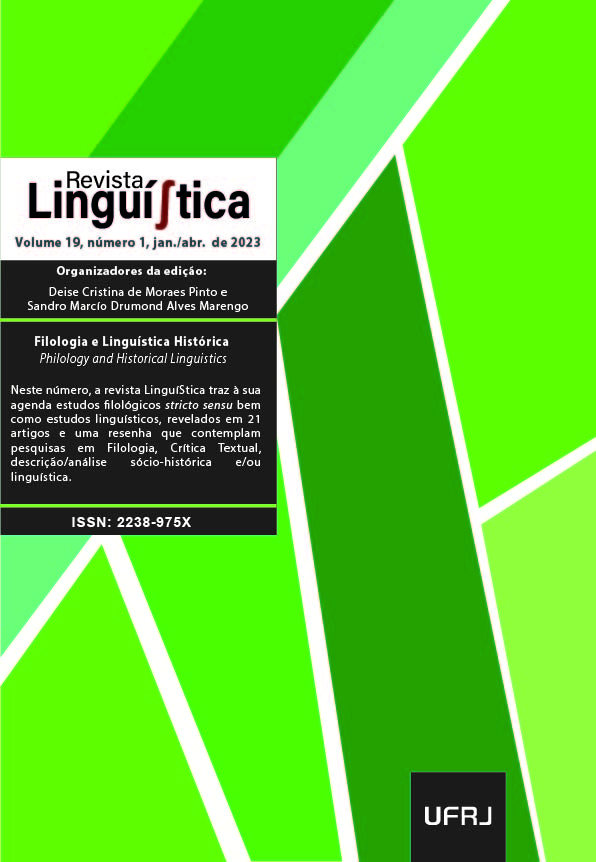Aspectos linguísticos da comédia italiana no renascimento: a relevância da língua florentina na construção de Mandragola de Maquiavel
DOI:
https://doi.org/10.31513/linguistica.2023.v19n1a57740Palavras-chave:
Maquiavel, língua italiana, comédia do Renascimento, Mandragola, FilologiaResumo
Este artigo se propõe a fazer uma análise linguística da comédia teatral mais importante do Renascimento italiano, escrita por Nicolau Maquiavel (1469-1527), Mandragola (1513-1518), que apesar de muito estudada por um viés político, deve ser também abordada em seu caráter literário e filológico. A partir da perspectiva dos estudos sobre a Questione della lingua e considerando ainda as questões apresentadas em outra obra do autor – Discorso o dialogo intorno alla nostra lingua – busca-se refletir sobre a importância da língua usada em suas comédias, não só para dar indícios da língua falada, mas principalmente para verificar as nuances que o autor dá para cada personagem, permitindo sua melhor interpretação. Não por acaso Maquiavel é considerado o primeiro teórico da comédia, e demonstra que seu interesse pelo gênero não era casual ou superficial, mas pela forma literária em si. Apesar de muitos críticos não considerarem suas outras peças por acreditarem se tratar de meras versões e traduções, é preciso ter em mente que o autor as escreve na língua florentina falada em seu tempo, o que aproxima o público e os leitores de seus textos teatrais. Muito do seu sucesso não provém somente dos temas que escolhe apresentar, mas da língua em que escreve suas peças. Por isso, ainda que seja impossível analisar todos os casos neste artigo, serão mostrados aqueles considerados mais relevantes dentro da Mandragola, que poderão ser utilizados para complementar a análise dos personagens presentes e das mudanças apresentadas na própria língua italiana.
Downloads
Downloads
Publicado
Edição
Seção
Licença
Copyright (c) 2023 Revista Linguíʃtica

Este trabalho está licenciado sob uma licença Creative Commons Attribution-NonCommercial 4.0 International License.
Autores que publicam na Revista Linguí∫tica concordam com os seguintes termos:
Os autores mantêm os direitos e cedem à revista o direito à primeira publicação, simultaneamente submetido a uma licença Creative Commons que permite o compartilhamento por terceiros com a devida menção ao autor e à primeira publicação pela Revista Linguí∫tica.
Os autores podem entrar em acordos contratuais adicionais e separados para a distribuição não exclusiva da versão publicada da obra (por exemplo, postá-la em um repositório institucional ou publicá-la em um livro), com o reconhecimento de sua publicação inicial na Revista Linguí∫tica.

A Revista Linguí∫tica é uma revista do Programa de Pós-Graduação em Linguística da UFRJ e se utiliza da Licença Creative Commons - Atribuição-NãoComercial 4.0 Internacional (CC-BY-NC)









